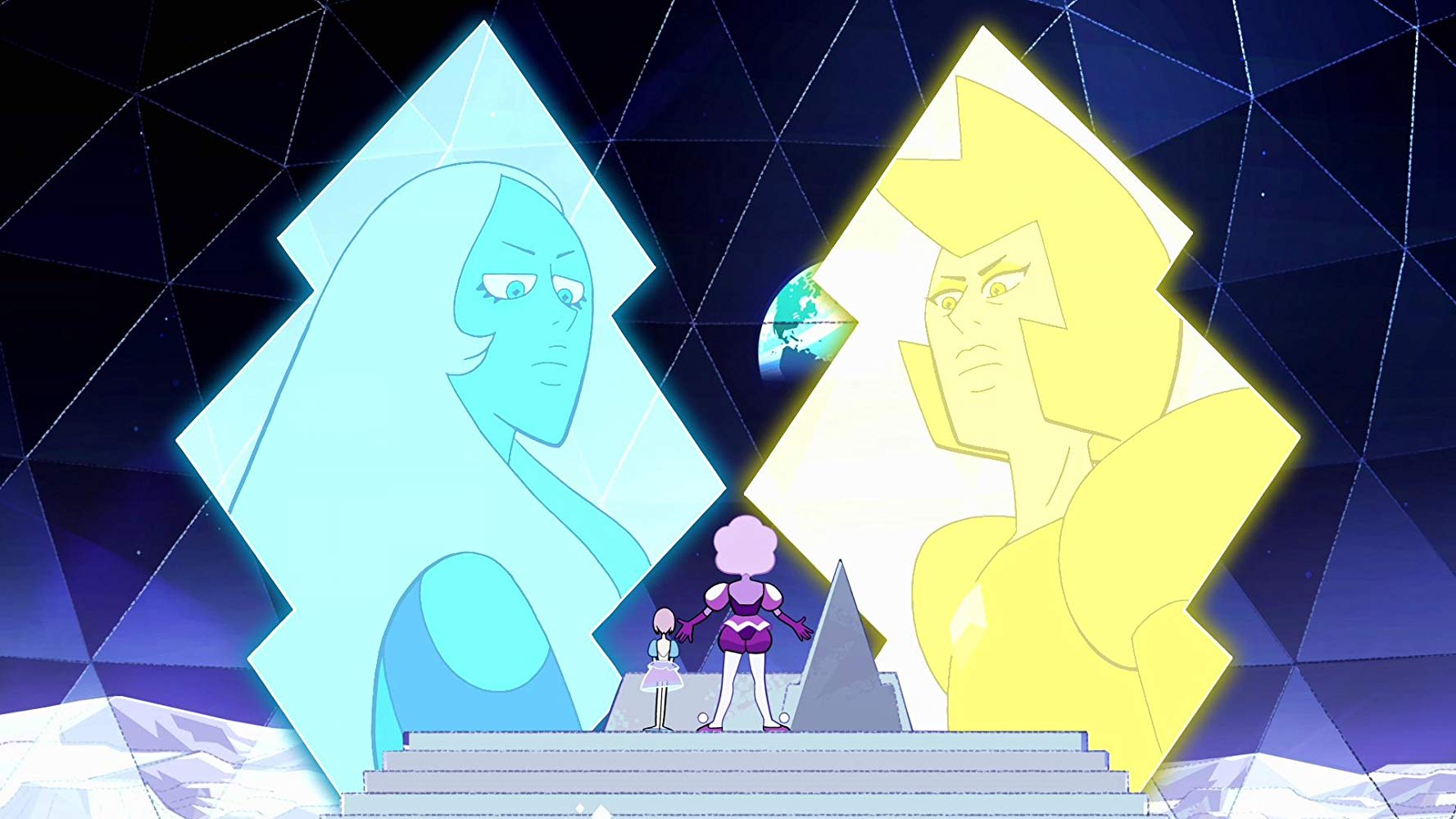
Part One: The Gems
Steven Universe is a Cartoon Network animated series created by Rebecca Sugar. It centers on Steven, a human-alien hybrid, as he tries to reconcile his supernatural powers with his human form. He lives with three powerful alien women, who call themselves the Crystal Gems. Together with the Crystal Gems, Steven fights distorted alien monsters, explores ancient relics of the long-forgotten past, unravels the mysteries of his own existence, and teaches everyone around him to love unconditionally.
Steven Universe was a cult smash, with fans and critics praising the show’s bold support of the LGBTQ+ community, its nuanced approach to discussing difficult topics, and its message of peace, love, and acceptance. It also boasts an incredible cast of voice actors, fascinating art direction, and some very catchy tunes.
In this deep dive analysis of Steven Universe, we will be looking at the show through a theological lens, discussing not only the Christian imagery and allegory, but also some notable deviations, which may be derived from other faiths and philosophies. Many have drawn parallels between Steven Universe and Jesus Christ, but few have explored the implications of the show’s daring subversions and gender reversals. After all, Steven’s mother is an alien, and his father is a human. So if Steven Universe is Jesus, then God is a woman.
This deep dive analysis will contain spoilers for Steven Universe seasons 1-5. I highly recommend watching the show before reading any further.
What if God Was a Woman?
Steven Universe is not the only story to feature a woman as God. For instance, in the Amazon Prime series Good Omens, God is voiced by Frances McDormand. However, Steven Universe is unique in that it puts God’s womanhood front and center. It wants you to notice that God is a woman.
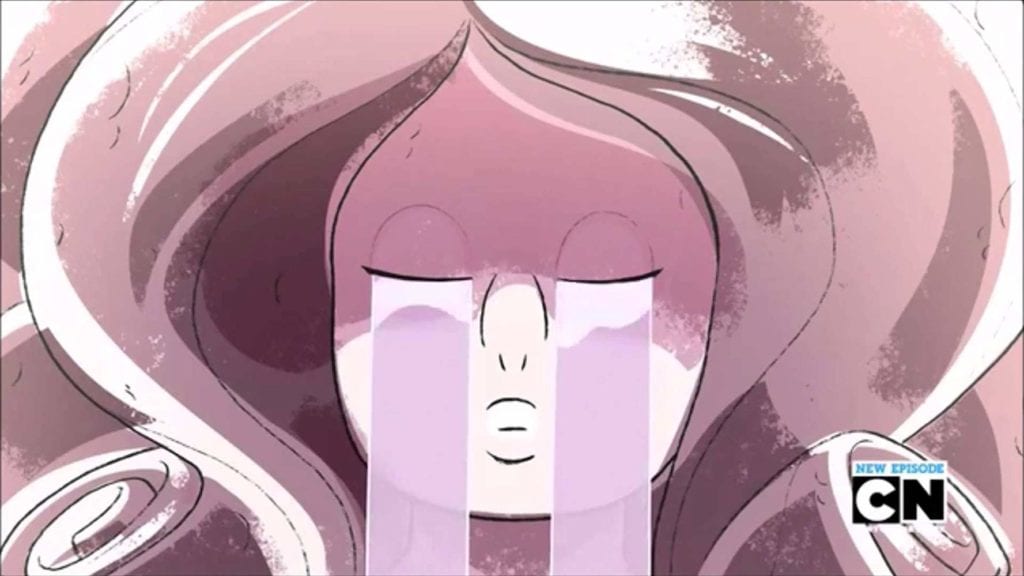
Rose Quartz has many of the traits that Americans traditionally associate with femininity. Rose is the only one of the Crystal Gems (other than Steven, eventually) with healing powers. She is portrayed as a maternal figure: voluptuous, kind, nurturing, sensual, and of course, bright pink. In fact, everything associated with Rose is pink. Her sword, her lion, her dress, her room, and even her spaceship.
In the season 5 episode “Legs from Here to Homeworld,” the audience finally gets a glimpse at the long-awaited reveal of Pink Diamond’s spaceship. Yellow and Blue Diamond’s ships are shaped like hands. As we learn later, White Diamond’s ship resembles a head and torso. Pink Diamond’s ship, then, of course, is a pair of bright pink legs.
But it’s not just legs. When we first see the ship in the episode “Lion 4: Alternate Ending,” we, the audience, don’t realize what it is we’re looking at. What we see is two pink protrusions, and nestled between them, a well-placed door. The spaceship intentionally evokes the image of a woman with her legs sprawled apart.

This is because of the true nature of Rose’s power. She, unlike every other Gem in existence, can create organic life. She is not just a Mother in an archetypal sense, but a true birth mother. In the episode “Lion 3: Straight to Video,” we see her pregnant body. Rose did not create Steven through immaculate conception. Her ultimate power derived from her sexuality.
The Crystal Gems and the Triple Goddess
Rose Quartz can be interpreted as a traditional western monotheistic deity, but the Crystal Gems may be representative of gynocentric polytheism. The concept of the Triple Goddess rose to popularity in the mid-20th century when historians began researching into the concept of divine trinities, believing 3 to be a revered holy number for ancient Romans and Greeks. Later, Robert Graves attempted to tie this reverence for the number 3 to Celtic myth, codifying the female trinity into the Triple Goddess, with the archetypes of Maiden, Mother, and Crone.
While most historians agree that there is little historical proof for worship of the Triple Goddess in ancient Europe, the idea is appealing. After all, the Holy Trinity of Father, Son, and Holy Spirit has no female equivalent in Christianity, which can be alienating for women.
The Triple Goddess may be a relatively new invention, but She appears regularly in our modern media. For example, in Game of Thrones, many of the characters pray to The Seven, a pantheon comprised of the Father, Smith, Warrior, Mother, Maiden, Crone, and Stranger. A male trinity, a female trinity, and one unknown Aspect.
Meanwhile, Steven Universe features a trinity of its own. The young and enthusiastic Amethyst is a perfect Maiden. As the only one of the Crystal Gems created on Earth, she represents hope for the future. Garnet is the Mother, the most physically powerful and attractive of the three Aspects. She is the physical embodiment of the love between two Gems. Lastly, Pearl, in all of her wisdom and despair, fills the role of Crone with tragic grace.
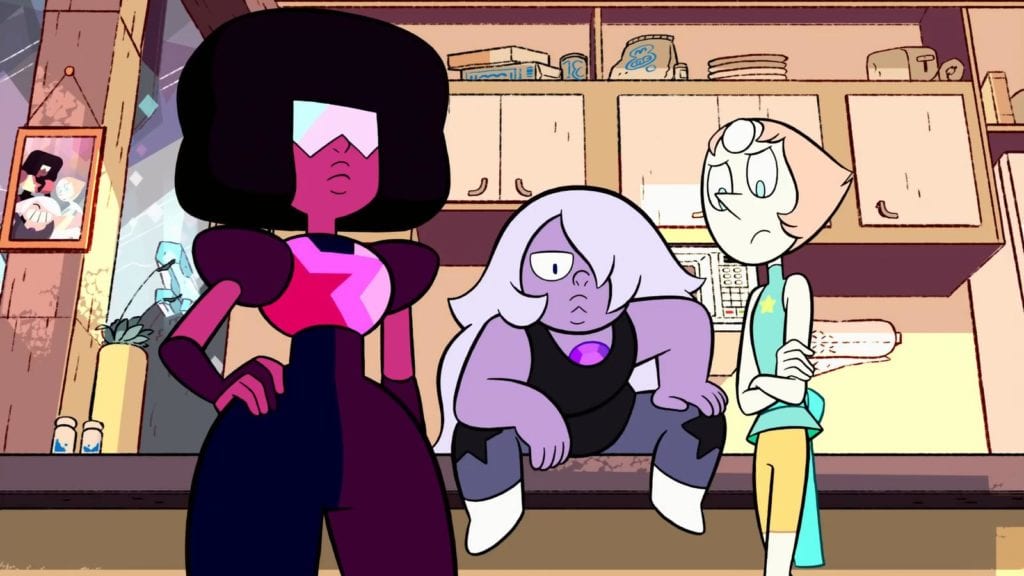
These unapologetic warrior women underline Steven Universe’s themes of freedom and acceptance. The Crystal Gems offer a rare glimpse into a world untouched by patriarchal values, where women have unlimited potential.
Steven Universe and Predeterminism
“The LORD has established his throne in heaven, and his kingdom rules over all. Praise the LORD, you his angels, you mighty ones who do his bidding, who obey his word. Praise the LORD, all his heavenly hosts, you his servants who do his will. Praise the LORD, all his works everywhere in his dominion. Praise the LORD, my soul.”
-Psalms 103:19-22
Predeterminism is a common belief that all events, including human actions, are decided in advance. Most western monotheistic faiths believe that God is omniscient (all-knowing) and omnipotent (all-powerful), so many followers of these beliefs subscribe to Theological Determinism.
In Theological Determinism, all events are pre-ordained by God. Theological determinists are likely to believe that all events, even those that result in suffering, are “God’s will.” This belief also tends to reinforce traditionalism, conflating the will of God with the status quo.
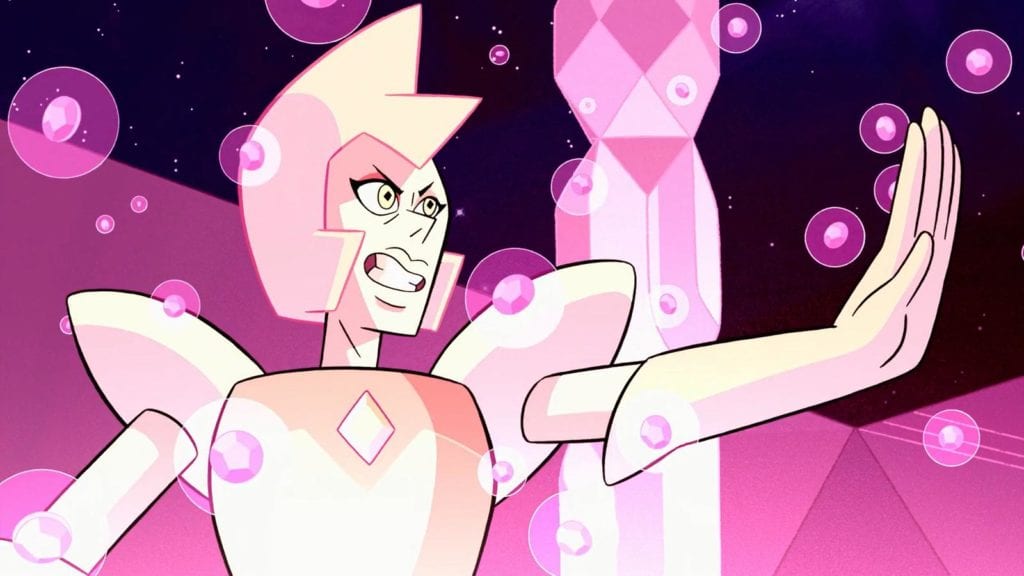
The Gems come from an alien planet called Homeworld. On Homeworld, all Gems have a predetermined purpose. Rubies act as common foot soldiers, Peridots are grown for their technological prowess, and rare Jaspers are military generals.
Homeworld is an imperial nation, operating under the unforgiving thumb of the Diamonds. Gems exhibit innate, unquestioning loyalty to their Diamonds. As a rule, they do not think, and they are not allowed to feel. Because gems aren’t permitted free will, it never occurs to them to question their way of life. The Gems live in a dystopia of Predeterminism.
For instance, when Peridot crash-lands on Earth, she is skeptical of the Crystal Gems. She belittles Pearl for her low birth status, insists that Garnet un-fuse for propriety’s sake, and bullies Amethyst for her stature. She believes that Gems are tools, not people in their own right. For her, freedom isn’t simply undesirable; it’s incomprehensible.
From Servants to Superheroes
“We are the Crystal Gems. We’ll always save the day. And if you think we can’t, we’ll always find a way. That’s why the people of this world believe in Garnet, Amethyst, and Pearl… and Steven.”
–Steven Universe, Opening Theme
In Steven Universe, the Gems are alien beings, descended from the heavens to bring “life” to planet Earth. That is, they are sent to drain its natural resources and indigenous life to establish a colony of their own.
Like angels, Gems are not granted the free will that is gifted to humankind. Instead, they follow orders and worship at the feet of the Diamonds, adhering to a strict hierarchy. They are conquerors, oppressors, and colonizers.
But humankind does not view them this way. Human beings, unaware of the Gems’ original intentions, ignorant of the violent wars of millennia past, come to trust the Crystal Gems. Rather than viewing them as the subjects of a war-hungry nation, the citizens of Beach City treat them like guardian angels.
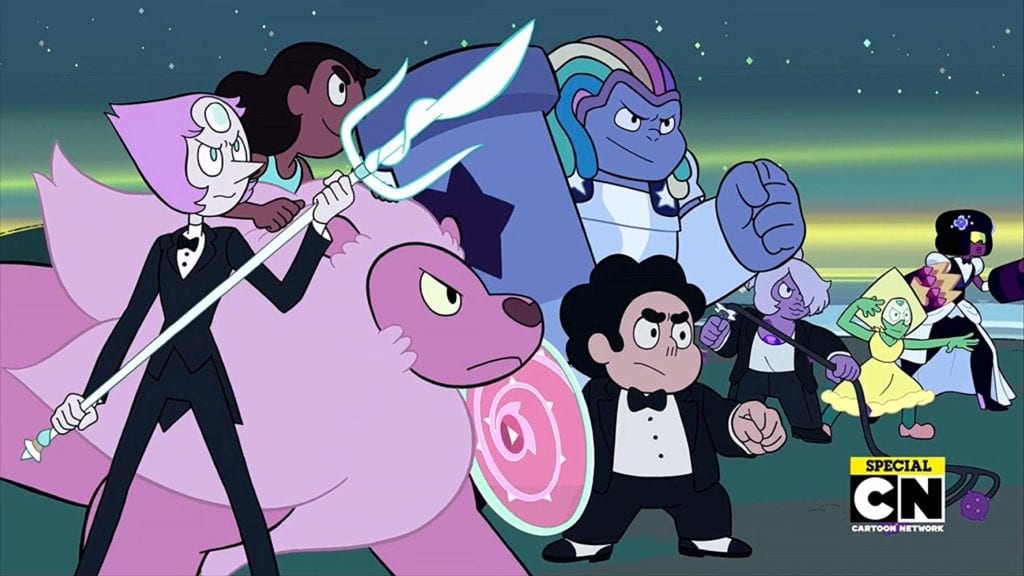
The Crystal Gems are free to pursue their own goals, yet they choose to protect humanity. Why? Because the citizens of Beach City accept them for who they are. This acceptance allows them the freedom to discover their unique identities. Free will is sacred, and the Crystal Gems will do everything in their power to protect it.
A Love Affair with Humanity
“Isn’t it remarkable, Steven? This world is full of so many possibilities. Each living thing has an entirely unique experience. The sights they see, the sounds they hear, the lives they live… are so… complicated. And so simple. I can’t wait for you to join them. Steven, we can’t both exist. I’m going to become half of you, and I need you to know that every moment you love being yourself, that’s me loving you, and loving being you. Because you’re going to be something extraordinary. You’re going to be a human being.”
–Steven Universe, “Lion 3: Straight to Video”
On Homeworld, Gems were limited by their station, unable to envision a world where they were free to choose their own destinies. They defined themselves by their “type” rather than their hopes, dreams, or desires. Most Gems didn’t realize that they could even have hopes, dreams, and desires.
All of that changed when Rose Quartz found Earth and humanity. For the first time, she saw beings that existed for the sheer experience of existence. Human beings didn’t have a “purpose.” More importantly, they didn’t have a concrete definition of the “Self.” Humans had a power that Gems had never before dreamed possible: the power of becoming.
This fluctuating state of existence proved too tempting for Rose Quartz to ignore, and she became the first Gem to ever fall in love with a human being. Unfortunately, her love was limited by her understanding. Until she met Greg, she and the other Gems treated humans like a novelty. Rose, especially, seemed to view humans as an entertaining distraction.
Rose believed that Earth held the secret to freedom, and she hoped to harness that power for herself. But in doing so, she caused a lot of pain.
The Complicated Legacy of Rose Quartz
“I’ve been thinking about you a lot lately, more than usual. For my whole life, I’ve been hearing stories about you. About how amazing you were, that you were so kind and loving. And every time I’d see the painting of you hanging in the temple, I’d be inspired and reminded of how much I had to live up to.
[But] you’re not my mom. This is how I want you to be, but I don’t know if this is how you really are. I finally know the truth. I know what you are. You’re a liar! I thought you never wanted to hurt anyone, but you hurt everyone! How could you just leave Garnet and Amethyst and Pearl, and Dad? They don’t know what to do without you. Maybe they didn’t matter to you as much as hiding from the mess you made! And that’s why I’m here, isn’t it? Did you make me just so you wouldn’t have to deal with all your mistakes? Is that all I’m here for?”
–Steven Universe, “Storm in the Room”
In season 4, following the shocking revelation that Rose Quartz shattered Pink Diamond, Steven questions his unflinching faith in his mother’s cosmic plan. Up until this point, Steven believed that his mother was omniscient and that there had been some “purpose” to his conception. Unfortunately, his quest to uncover the truth leaves more questions than answers. In the episode “Storm in the Room,” Steven confronts the idealized image of his mother and demands explanations, in a scene reminiscent of Jesus at Gethsemane.
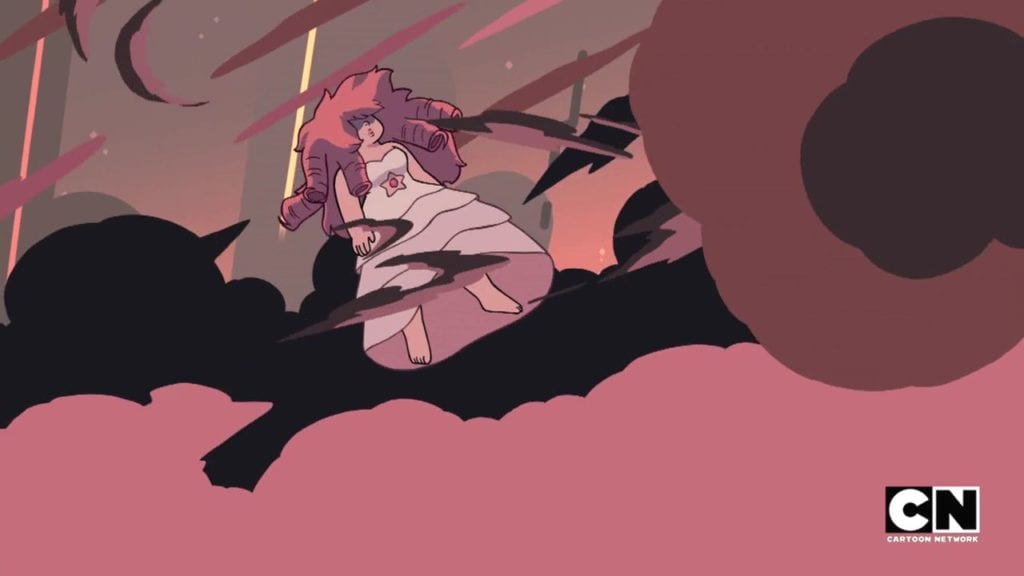
An Imperfect God
A few episodes later, Steven uncovers a video tape labeled “For Nora,” which contains the same message from his mother that he’d received on a tape labeled “For Steven.” When Steven confronts his father with the tape, Greg explains that neither Rose nor Garnet could predict the unborn child’s sex. Human mutability proved to be more powerful than Rose’s seemingly infinite knowledge of the universe. With this new understanding, Steven finally comes to terms with the fact that Rose Quartz wasn’t perfect. She may have been a God, but she was not omniscient.
In most western monotheistic faiths, God is considered to be omniscient, omnipotent, and good. But it’s difficult for some to accept this view of God because of the existence of evil. Why would an all-powerful, all-knowing, and all-loving creator allow suffering to exist?
Philosophers and theologists have tried to argue that Free Will is an answer to The Problem of Evil, claiming that evil is a human invention, a byproduct of free will. Unfortunately, this argument fails to consider that suffering isn’t always caused by, or limited to, human beings. Steven Universe sidesteps this issue completely, positing that the existence of free will supersedes omniscience. In other words, life is unpredictable; therefore, God cannot predict the future.
Steven Universe and Process Theism
Process theism is a modern philosophical school of thought that attempts to deconstruct our concept of God as omniscient and omnipotent. Instead, process theists believe that God may be as fluid and changeable as existence itself.
In Process Theology: A Basic Introduction, C. Robert Mesle states:
“God is love. It is through God’s love that all things live and move and have their being. God is the supremely related One, sharing the experience of every creature, and being experienced by every creature. God’s power in the world is necessarily persuasive, not coercive. God acts by Self-revelation. God, who is the source of our freedom, cannot coerce the world. Because God loves perfectly, God suffers with the world, calling us in each moment through divine self-revelation, sharing a vision of the good and beautiful. Our experience with God is inherently interwoven with our experience of the world, so that these shape each other. Thus revelation is omnipresent and ongoing, but always ambiguous.”
C. Robert Mesle, Process Theology: A Basic Introduction
Though still dogmatic in its approach, this concept of God as an imperfect, mutable being, especially in a monotheistic context, is downright revolutionary. Process theists don’t need to worry about The Problem of Evil or predeterminism. Instead, they can focus on God’s infinite capacity to love.
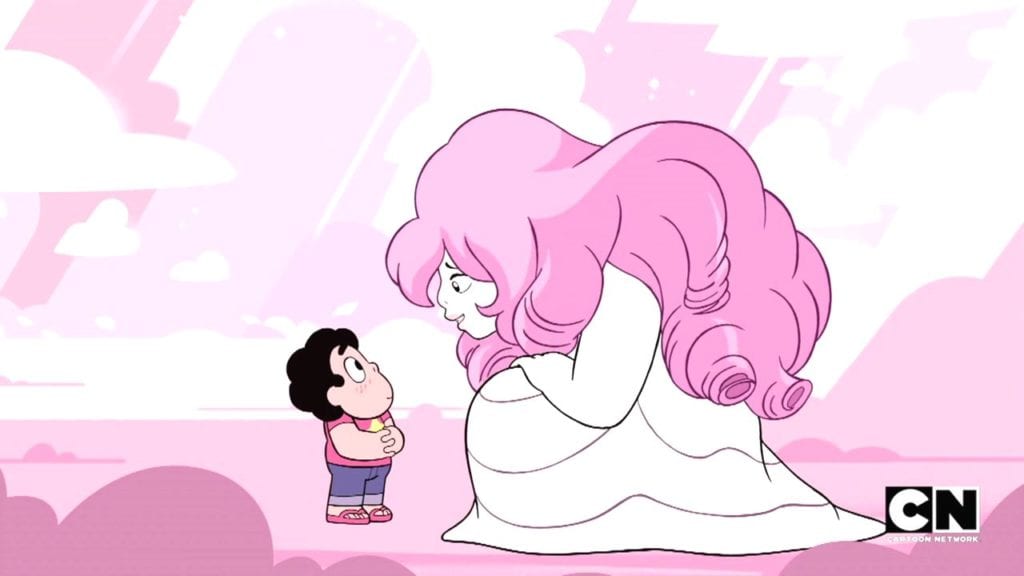
Since these ideas were introduced, many writers have attempted to portray God as a limited, fluid being. (Piers Anthony’s Incarnations of Immortality series and Phillip Pullman’s His Dark Materials series come to mind. The film Dogma portrays God’s penchant for skee-ball as a weakness that almost destroys the universe.) In these portrayals, some worshipers have found comfort, understanding, and even forgiveness. Thus, process theism may have laid the groundwork for Steven Universe’s portrayal of Pink Diamond.
The Truth About Pink Diamond
Pink Diamond was the god of Earth. She may not have created it, but she was its steward. All of the Gems created on Earth fell under her domain, even if the humans did not.
In the season 5 episode “Now We’re Only Falling Apart,” we finally learn the truth. Pink Diamond was a god of seemingly infinite power, and yet in her limitless detachment, she felt bored and trapped. Inspired by Pearl, Pink Diamond donned a disguise and traveled to Earth to mingle with newly created Gems.
On Earth, Pink Diamond saw life. But more importantly, for the first time, she saw freedom. Not only the freedom to act as one desired, but the freedom to create oneself. This freedom of experience and self-actualization opened up a new pathway for Pink Diamond. It gave her the ability to love.
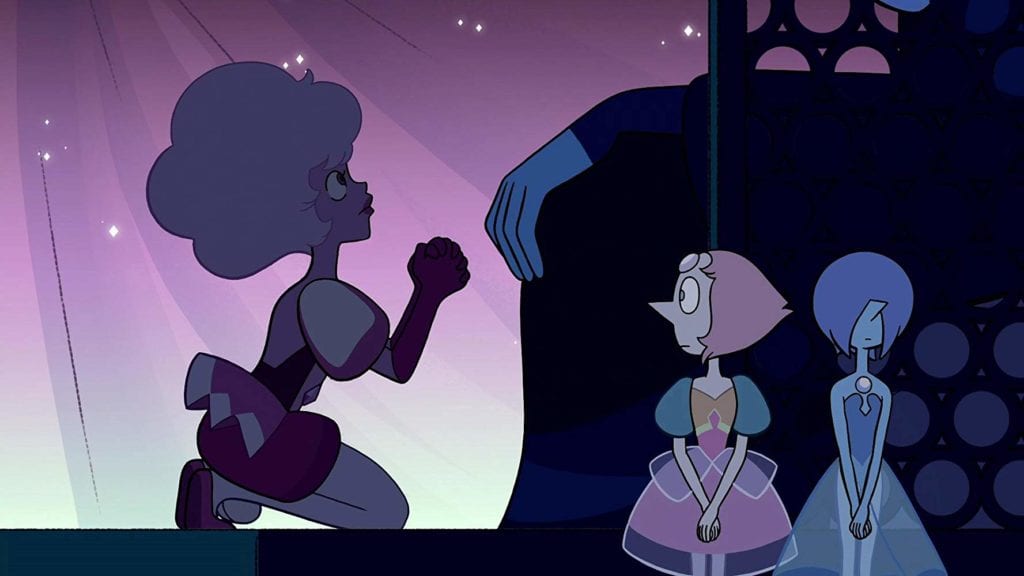
Pink Diamond gave up everything to live on Earth, and instead of forcing her will on others, she lived in the moment, a childlike observer, bathing in each new experience. The Crystal Gems believed that she was their leader and worshiped her as a liberator, but in truth, she was being led. She allowed the experiences of her friends to shape the world in which they lived.
“Before Garnet, Rose was only fighting for Earth, but Garnet changed everything. Rose wanted to fight for her. She wanted to fight for Gems. And maybe she was foolish, and maybe even selfish. But maybe she was… following us. This whole time we thought we were following her, but she was following us. How could she not after [Pearl] swept her off her feet?”
–Steven Universe, “Now We’re Only Falling Apart”
The Missing Piece
In the world of Steven Universe, human mutability is preferable to the rigidity of the infinite. Pink Diamond was not a moral figure, as God is often envisioned to be. Instead, she strove toward love and good for the sheer hedonistic pleasure of it. For Pink Diamond, liberation was the ultimate good, and every action she took was in pursuit of freedom.
But liberation alone cannot end suffering. What Pink Diamond lacked, what she had to learn through Steven, her human conduit, was empathy.
Read on in Part 2…



